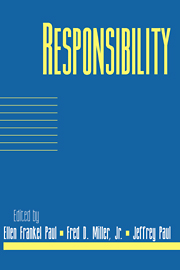Book contents
- Frontmatter
- Contents
- Introduction
- Acknowledgments
- Contributors
- Causation and Responsibility
- Negligence
- Responsibility and Consent: The Libertarian's Problems with Freedom of Contract
- The Irrelevance of Responsibility
- On Responsibility in Science and Law
- Responsibility and the Abuse Excuse
- Why Citizens Should Vote: A Causal Responsibility Approach
- Institutionally Divided Moral Responsibility
- Fate, Fatalism, and Agency in Stoicism
- Ultimate Responsibility and Dumb Luck
- Taking Responsibility for Our Emotions
- Index
Why Citizens Should Vote: A Causal Responsibility Approach
Published online by Cambridge University Press: 06 January 2010
- Frontmatter
- Contents
- Introduction
- Acknowledgments
- Contributors
- Causation and Responsibility
- Negligence
- Responsibility and Consent: The Libertarian's Problems with Freedom of Contract
- The Irrelevance of Responsibility
- On Responsibility in Science and Law
- Responsibility and the Abuse Excuse
- Why Citizens Should Vote: A Causal Responsibility Approach
- Institutionally Divided Moral Responsibility
- Fate, Fatalism, and Agency in Stoicism
- Ultimate Responsibility and Dumb Luck
- Taking Responsibility for Our Emotions
- Index
Summary
some rationales for voting
Why should a citizen vote? There are two ways to interpret this question: in a prudential sense, and in a moral (or quasi-moral) sense. Under the first interpretation, the question asks why–or under what circumstances–it is in a citizen's self-interest to vote. Under the second interpretation, it asks what moral (or quasi-moral) reasons citizens have for voting. I shall mainly try to answer the moral version of the question, but my answer may also, in some circumstances, bear on the prudential question. Before proceeding to my own approach, let me briefly survey alternatives in the field.
Many theorists approach the issue from an economic or rational-choice perspective, and they usually have in mind the prudential question. On a standard version of this approach, it is considered rational for a citizen to vote if and only if the expected personal benefit of voting exceeds the expected cost. Confronted with a choice between two candidates, C and C', a prospective voter should ask how much he values getting his more preferred candidate as compared with his less preferred one. This difference in value should be multiplied by the probability that his ballot, if cast, would change what would otherwise happen. The resulting expected value should then be compared with the expected cost of voting, which might include the time lost from work, and the inconvenience of traveling to the polling site, standing in line, and so forth.
- Type
- Chapter
- Information
- Responsibility , pp. 201 - 217Publisher: Cambridge University PressPrint publication year: 1999

